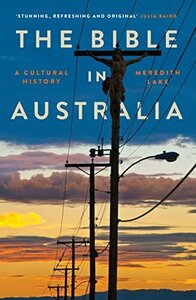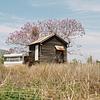You need to sign in or sign up before continuing.
Take a photo of a barcode or cover
challenging
reflective
slow-paced
This was such a fascinating read, a uniquely angled book on the history of Australia through the lens of the Bible, the different interpretations and the role the Bible played and still does play in Australian culture. From the formation of our schooling system, to war, immigration, native title and the debate around what makes the ‘good society’, this book is thoroughly researched, deeply insightful, and a very enjoyable read.
I heard recently someone say "Cultural Christianity is burning up," but this is not (just) a book about the history of cultural Christianity and the bible in Australia, but also how God has, and still is using the bible to profoundly transform individuals across our history. If you want to understand how the bible has profoundly shaped Australian culture and history, where it's place has been in culture, and where it now sits, this is required reading. Her distinction between the bible as a western european colonising tool and the theological bible, was very helpful. I learned heaps.
This was such a fascinating read, a uniquely angled book on the history of Australia through the lens of the Bible, the different interpretations and the role the Bible played and still does play in Australian culture. From the formation of our schooling system, to war, immigration, native title and the debate around what makes the ‘good society’, this book is thoroughly researched, deeply insightful, and a very enjoyable read.
informative
inspiring
reflective
medium-paced
Minor: Alcoholism, Domestic abuse, Genocide, Racism, Violence, Murder
One of the best histories I've read in recent times, this volume is part history of Christianity in Australia, part cultural study of the impact of the Bible, and wholly engrossing to read. The book deals both with initial attempts to convert Aboriginal peoples to Christianity, as well as the varied role of the Bible in the early colony, through 19th Century missions, the influence of Biblical thought in developing 20th Century cultural norms, and briefly, modern debates around meaning and role. It is the material around early Australia, and the complexity of relationships developed by Aboriginal communities and individuals to the Bible that I found the most compelling - there is more detailed work on many individual communities, but this is the best summary approach I have seen. Lake's explanation of the dilemmas of Bible translation - whether to use existing concepts, hence adapting the text to local culture, or to insist on using English or Latin for them - even words as simple as belief - highlights the impossibility of viewing the Bible as an entity outside of the cultural context in which it is engaged with.
This is a straightforwardly historical account - while both theological and cultural identities of the Bible are dealt with, it is through a historian's lens of who, what, when, where and how, not a deep pondering of the theology itself. I discovered that the Methodists were large in the 1890s Labor Party, only to be driven out by the introduction of binding caucuses, paradoxically leading to the strong Catholic associations that lasted to the DLP split. Also the way that the Bra Boys in Maroubra repurpose Biblical quotes and concepts to mean almost the opposite to the original context ("Yea, though I walk through the valley of evil, yet I shall fear no evil, for I am my brother's keeper").
Lake has an (thankfully) understated writing style for a modern historian, with the occasional sting in the tail of a sentence. This is a thoughtful and considered history, keen to clearly acknowledge the diversity of experiences between Australians and Christianity, including the great harms of dispossession and land theft, and systematic sexual, emotional and physical abuse. Lake views these are deviations and failures of Christianity "Christianity has rarely been sufficient, in itself, to prevent acts of racial oppression" ... "the failures of the institutional church to protect children from abuse at the hands of its leaders and clergy." and the book does not examine how dynamics within the Bible or Christianity might encourage or discourage these dynamics - which is clearly not the role of the book. Lake also, as a historian of Christianity, focuses on the Biblical impact without a great deal of broader discussion about other factors. At times this leads to cause-effect implications I felt were overstretching (the Biblical influence on our ritualistic ANZAC Day culture). Lake's pleas for an ongoing structured role for Biblical examination rest on her assertion of its importance to the development of national culture, which requires also consideration of the contribution of other religious and secular traditions and texts. But this is not even quibbling - the book is much richer for its clear focus on the history of the Bible, and the movements surrounding it. At a time when religion is increasingly contested, the rigour behind this text is badly needed, and the book is a triumph.
This is a straightforwardly historical account - while both theological and cultural identities of the Bible are dealt with, it is through a historian's lens of who, what, when, where and how, not a deep pondering of the theology itself. I discovered that the Methodists were large in the 1890s Labor Party, only to be driven out by the introduction of binding caucuses, paradoxically leading to the strong Catholic associations that lasted to the DLP split. Also the way that the Bra Boys in Maroubra repurpose Biblical quotes and concepts to mean almost the opposite to the original context ("Yea, though I walk through the valley of evil, yet I shall fear no evil, for I am my brother's keeper").
Lake has an (thankfully) understated writing style for a modern historian, with the occasional sting in the tail of a sentence. This is a thoughtful and considered history, keen to clearly acknowledge the diversity of experiences between Australians and Christianity, including the great harms of dispossession and land theft, and systematic sexual, emotional and physical abuse. Lake views these are deviations and failures of Christianity "Christianity has rarely been sufficient, in itself, to prevent acts of racial oppression" ... "the failures of the institutional church to protect children from abuse at the hands of its leaders and clergy." and the book does not examine how dynamics within the Bible or Christianity might encourage or discourage these dynamics - which is clearly not the role of the book. Lake also, as a historian of Christianity, focuses on the Biblical impact without a great deal of broader discussion about other factors. At times this leads to cause-effect implications I felt were overstretching (the Biblical influence on our ritualistic ANZAC Day culture). Lake's pleas for an ongoing structured role for Biblical examination rest on her assertion of its importance to the development of national culture, which requires also consideration of the contribution of other religious and secular traditions and texts. But this is not even quibbling - the book is much richer for its clear focus on the history of the Bible, and the movements surrounding it. At a time when religion is increasingly contested, the rigour behind this text is badly needed, and the book is a triumph.



